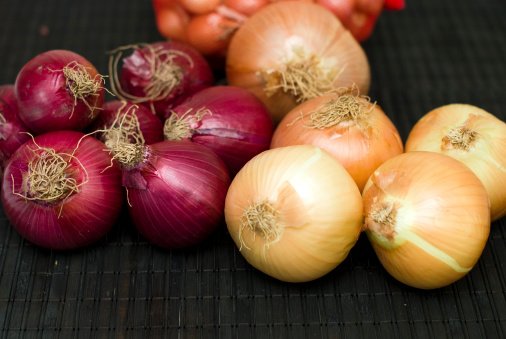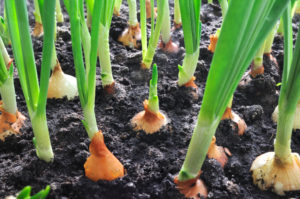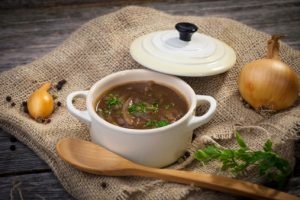We add nutritious onions to our meals even though we get teary from them. Onions are high in protective phytonutrients, vitamins, and unique anti-inflammatory nutrients. Also, they are low in saturated fat, sodium, and cholesterol. Being so high in nutrients makes them ideal for weight loss and maintaining optimum health. Onions are for sure a SuperFood.
“Onions for Better Health” say WHO
WHO recognizes that onions help relieve symptoms such as
coughs, congestion asthma, and respiratory infections.
Health Benefits of Nutritious Onions
Cardiovascular Benefits & Heart Health
Onions contain a variety of naturally occurring chemicals known as organosulfur compounds. These are similar to those found in garlic which is linked to lowering blood pressure and cholesterol levels.
They help keep a heart healthy in many ways by lowering blood pressure and heart attack risk. A study in 2002, suggests that sulfur acts as a natural blood thinner and prevents blood platelets from aggregating. The risk of heart attack and stroke increases when platelets cluster.
Improves Bone Density
It was found that women going through or post-menopause that consumed onions daily had improvement in bone density. – 2009 study published in the journal Menopause. Also, those in the study that ate onions frequently had a 20 percent lower risk of hip fracture than those who did not eat onions
Good for Digestion
Oligofructose found in onions helps prevent and treat types of diarrhea according to a 2005 study, published in Clinical Gastroenterology and Hepatology. The National Onion Association states that the phytochemicals in onions that scavenge free radicals may also reduce the risk of developing gastric ulcers.
Also, onions are high in fiber which promotes good digestion and helps keep you regular.

Protection Against Cancer
Onions provide protection against stomach cancer as they are rich in sulfides. In a 2015 study, intake of allium vegetables, which includes onions, were associated with reduced risk of gastric cancer
A recent study from the Netherlands was discussed by the National Onion Association showing that twice as much quercetin was absorbed by those who ate onions as those who drank tea, and three times as much as those who ate apples, which are also high in quercetin. Red onions are especially high in quercetin. Yellow onions and shallots are also great options, while white onions contain the least amount.
The consumption of raw yellow onion helps reduce insulin resistance and hyperglycemia in breast cancer patients who were undergoing a form of chemotherapy known to cause insulin resistance. – 2016 a study published in Integrative Cancer Therapies.
Anti-inflammatory
The sulfur in onions may be effective anti-inflammatory agents according to a 1990 study in the journal International Archives of Allergy and Applied Immunology.
Helpful for Asthma
Quercetin in nutritious onions relaxes the airway muscles and may provide relief of asthma symptoms. – 2013 study in the American Journal of Physiology.
Immune System Booster
A strong immune system is encouraged by eliminating free radicals which quercetin in onions does. Also, it reduces allergic reactions by stopping your body from producing histamines, which causes you to itch, sneeze or have watery eyes.
Regulates blood sugar
Onions are rich in chromium which helps regulate blood sugar, and the sulfur increases the production of insulin. Diabetics who ate red onions showed reduced glucose levels for up to four hours. – 2010 study published in the journal Environmental Health Insights.
Patients with Type 2 diabetes had more normalized liver enzymes and lower glycemic levels when consuming sliced onions, according to The journal Nutrition 2014 study.

Green Onions as Alternative Medicine
- They are mainly used as a traditional medicine for common cold.
- They stimulate the respiratory tract and helps in expelling sputum (phlegm).
Please Note
- They are safely consumed by most people, but consuming large quantities of onions can cause stomach and gastrointestinal distress resulting in nausea and diarrhea.
- As for the danger of keeping and using leftover raw onions; I could not find any substantiated information on this.
Onion Nutrition
They are low in saturated fat, sodium, and cholesterol. High in vitamin C, dietary fiber, vitamin B6, folate, and manganese. The nutritional value of onions makes them ideal for weight loss and maintaining optimum health. Go here for more information on onion nutrients.
Also, like most vegetables are alkaline-forming.
“It’s probably illegal to make soups, stews and casseroles without plenty of onions.” ~ Maggie Waldron, American author and editor
Onion History
- People began to eat wild onions very early – long before farming or even writing was invented. Very likely, this humble vegetable was a staple in the prehistoric diet.
- They have been cultivated for over 5,000 years in Asia and the Middle East.
- Today, onions rank sixth among the world’s leading vegetable crops.
- The consumption of onions in the U.S. has increased approximately 50 percent over the past 20 years, according to the National Onion Association.
Nutritious Onion Trivia
- Ancient Egyptians worshiped the onion. They believed its shape and rings symbolized eternity; it was the only vegetable that was made out of gold.
- Early American settlers used wild onions to treat colds, coughs, and asthma, and to repel insects.
- In Chinese medicine, onions have been used to treat angina, coughs, bacterial infections, and breathing problems.
- Sugar and onion juice form syrup, much used in domestic practice, for a cough and other affections of the air-tubes among children.
- By eating parsley you can get rid of onion breath.
- The largest onion ever grown weighed 10 lbs 14 oz by V. Throup of Silsden, England according to the Guinness Book of World Records.
- In ancient Greece, athletes ate large quantities of onion because it was believed to lighten the balance of the blood.
- Gladiators in Rome had an onion rub down to firm their muscles.
- In the Middle Ages, people would pay their rent with onions or give them as gifts.
“An onion can make people cry, but there has never been a vegetable invented to make them laugh.” ~ Will Rogers
Onion Tears?

There are many scientific technical terms regarding onions causing tears (lachrymatory factor (LF), 1-propenyl-L-cysteine sulphoxide, alliinase enzyme, lachrymatory-factor synthase etc.) which is way too technical for me.
Let’s hope they don’t figure out how to genetically engineer the gene that takes the tear-making factor out of the onion.
What we really want to know is how to cut onions without the tears, right?
Fewer Onion Tears with these 5 Tips
- Chilling the onions for an hour before cutting will slow down the onion’s metabolism.
- Best to cut off the onion root as that is where the highest concentration of enzymes that produce tears exists.
- Open the window when you cut onions.
- Wear glasses or goggles.
- It has been recommended that you cut onions under running cold water, but I do not recommend it as the nutrients will go down the drain.
The Best Onions to Use in Food Preparation
- Red onions are best raw in salads or sandwiches; also for grilling.
- A yellow onion turns rich, dark brown when cooked making it great for French onion soup.
- White onions turn a golden colour and are sweet when sauteed and are used in Mexican cuisine.
How to Store Onions
- They need to be stored in a well-ventilated place at room temperature, away from bright light and heat. They do not need to be refrigerated but green onions need to be refrigerated.
- Do not be store them near potatoes as they will absorb their moisture and ethylene gas, which will cause them to spoil quickly.
Please remember that onion rings are NOT a health food.
Now I ask: What would life be like without nutritious onions, a superfood?
Nutritious Onion Recipes

Vegan Onion Soup for Dinner or Lunch– A classic recipe that is vegan – and just as healthy as the original.
Vegan Onion Gravy is Delicious – This onion gravy is a wonderful delicious addition to any vegetarian meal. I love that it is vegan too. So easy to make too. A vegan, gluten-free, sugar-free classic.
100+ Superfoods
Learn more about some of the healthiest vegetarian foods you will always want to have in your pantry or growing on your deck.
READ: Superfoods – Over 100 of the Healthiest Foods You Should Have in Your Diet and learn more about the variety of Superfoods we think you should have in your diet.
READ Inflammation: Is it Good or Bad for Your Body?
We hear about inflammation often but do we really know what it is? Inflammation is an important immune system function. When it is out of control, it can cause serious damage. Inflammation has been linked to major diseases such as Alzheimer’s, arthritis, cancer, diabetes, heart disease, and signs of aging. There’s good news: many foods are naturally anti-inflammatory. Adding Natural Anti-Inflammatory Foods to your meals is a very good way to reduce inflammation. Antioxidants found in foods protect your cells from the effects of free radicals and can help reduce an overabundance of inflammation in your body.


.Naturally, I love onions.. I think its actually a ‘powerfood’… The question is, ‘is the nutrient that makes eyes teary harmful to the eyes??
I don’t think so if you are just cutting them when it happens. I would not put onions in the eyes.
“Chopping onions can cause some burning and irritation and tears,” Dr. Rosa said. “Other than that, it’s pretty safe on your eyes. It’s a temporary sensation with no known long-term effects, nor will it worsen any other conditions, like pink eye.”